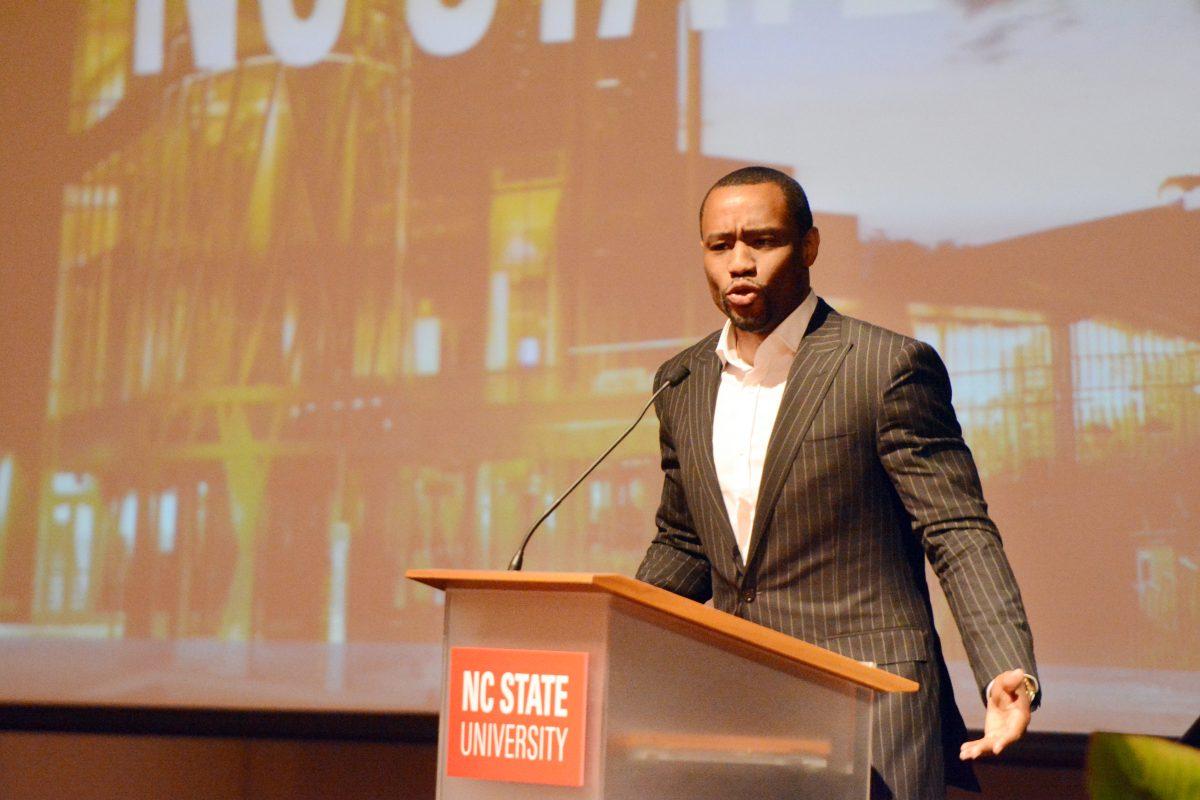
Brandon Lang
News correspondent Marc Hill speaks for Pan Afrikan week. He gave his lecture inside Talley Student Union in the Ballroom from 7 to 8:30pm on Monday, April 4, 2016.
Marc Lamont Hill gave a lecture about police brutality, the economy, education and elections at Talley Ballroom as part of Pan-Afrikan Week 2016. More than 300 people attended the lecture, titled “Fighting for Freedom in an Hour of Chaos.”
Hill is a distinguished professor of African American studies, journalist, television personality, social justice activist and author. His latest book, “Nobody: Casualties of America’s War on the Vulnerable, from Ferguson to Flint and Beyond” will be released on July 12.
The talk was sponsored by the Society for Afrikan American Culture, the Union Activities Board’s Black Student Board, the Unit of Interdisciplinary Studies and major Africana Studies, the College of Humanities and Social Sciences and the African American Cultural Center.
“They say you can’t read and write, but they make it illegal for you to read and write,” Hill said. “They say you’re lazy, but they make you a slave, they say you’re dirty, but you clean people’s houses. They say you’re uncivilized, but you raise their children. This is the fundamental contradiction of being an African subject in America, and the challenge of the African writer, thinker and freedom fighter has been to get American to listen to itself.”
Lymar Lyons, a senior studying accounting and HR management found the lecture to be enlightening and uplifting.
“It was a different side than what most of us are used to seeing — I’m not saying that he’s not like this on TV, but also he was able to be more open than being constrained when being in the public eye on TV. He really kept it real and authentic,” Lyons said.
As for where he stood in regards to these issues, Hill said he’s not a pessimist.
“I am not at all cynical, I am not at all bitter,” Hill said. “I am incredibly excited to see what we have in this place and at this moment existing. I am incredibly excited by that, but sometimes we can become so engraved with the moment, so excited by what we’ve done, that we lose track of what we have not done.”
Hill included inspirational quotes throughout his lecture, encouraging students to participate in social justice movements.
“Stop feeling sorry for yourself,” Hill said. “Stop feeling bad that you’re alone. Understand that every freedom movement starts with a small number of people and it only looks big at the finish line. Every group had a group of small, dedicated folk that learned to make revolution and a whole bunch of folk that was scared of revolution. You take your three people, take your five people, brave people.”
Craig Brookins, professor of Africana Studies, defines Pan-Africanism as the notion that “wherever people of African descent in the world, we’ve been challenged by the same forces that sought to oppress us. Therefore, it’s incumbent upon us to recognize those common enemies that we have with each other more so than the differences we have, and by recognizing those commonalities we can uplift ourselves in thought, in action and really in a liberating way.”
Brookins also said he was pleased with lecture.
“I am mostly glad because unfortunately we don’t often get an intellectual presentation that is rich with the kind of interdisciplinary knowledge and information that our speaker today brought,” Brookins said. “I think it’s important for students to hear and begin to understand — It captures what we’re trying to do with Africana studies in terms of our teachings.”
Toni Harris Thorpe, program coordinator for the African American Cultural Center, said that what makes this lecture exceptional is that “[Hill] called to action individual responsibility to clarify what we believe, and once we clarify that we have a responsibility to act on it.”
Thorpe spoke about the importance of Pan-Afrikan Week.
“Pan-Afrikan Week gives us an opportunity to stop and understand what Pan-Africanism really is and what it means today,” Thorpe said. “It brings to light the responsibility of knowing the truth and questioning who we learn that truth from and who’s accountable for our intellectual development.”
Pan-Afrikan Week ends Saturday and will feature more events that can be found on the Union Activities Board website, uab.ncsu.edu.